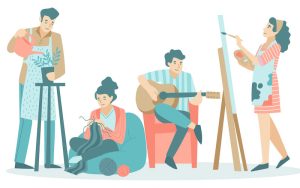Today, a designer’s expertise may become irrelevant in a few of years. Clients are becoming more discerning, making it necessary for designers to have a wider range of expertise than ever before. Working in-house where you may be restricted to an out-of-date style guide or a lack of modern software might make it more challenging to stay on top of your game.
Freelance designers, on the other hand, need to keep a careful eye on their abilities lest they fall behind the pack. We’ll discuss several strategies for keeping up with the latest developments in relevant skill sets without exhausting yourself trying to play “catch up” all the time.
Turning it inside out
Understanding your client’s challenges from the inside out is a great strategy to stay ahead of the competition and develop the abilities you’ll need to help them. Instead of seeing freelancing as a means to a goal, it’s vital to put yourself in the shoes of your client’s end-user at all times.
In what ways do they anticipate being surprised? Then it’s just a matter of figuring out what knowledge is necessary to give that person the greatest experience possible.

If you’re at a loss as to which new programming languages you should learn or which new software you should seek training for, this is an excellent strategy to employ. When the user’s expectations shift, you must as well.
Outsourcing for fun, and profit
Often designers will hire someone else to do something they aren’t very skilled at. There’s no harm in doing this, and in fact I’ve suggested it to designers who are struggling to keep up with all they need to accomplish on several occasions.
In order to be of any use to a customer as a consultant, you must be able to provide the service(s) for which the client has hired you. Selling them on the idea of hiring you will be more challenging if they are looking for a designer who can also code.
Look for assets, not crutches
Relying only on a third-party contractor for a crucial function of your organization is, in most cases, a bad idea. If you routinely use outsourcing, ask yourself if you wouldn’t be better off teaching yourself the skill.
Because of the obvious assurance you exude when you know what you’re doing, your clients will place a higher value on your services.

Another option is to form a long-term partnership with someone, possibly the contractor you outsource most work to, and market your services to a larger clientele as a team. The perfect company collaboration may raise your productivity and profitability enormously, but working with others has its own unique set of problems.
Follow your heart
You can usually integrate your favorite abilities into your design process and the services you provide to customers. Skills that may seem “strange” or irrelevant at first glance may end up being useful in unexpected ways and help you stand out to potential clients.
My interest in cooking and eating could appear unrelated to design, for instance. Not only does my background in the culinary arts serve as a conversation starter, but it also helps me build trusting relationships with the restaurant owners and chefs who make up my specialized market.
In fact, they can’t wait to start working with someone who has true interest and expertise in their field.
Mine your hobbies
In their leisure time, when they’re not working, all of the people reading this have hobbies. Don’t forget that your hobbies are also talents that may help you stay current and appealing to the kinds of customers that value them.
Hobbies, like other ostensibly unrelated abilities, may frequently steer you in the direction you should be working on in your profession if you want to succeed in the field of design.

Everyone of us need to work toward a situation in which we may focus only on our passions. Some work is typically required, but if you bring your interests and passions into the process, you may find success much more quickly.
Target practice
Taking on a freelancing job with more moving parts than normal might be a terrific opportunity to acquire or practice a new talent you’ve been hoping to pick up. Here’s a chance to get in and get some real-world experience in the field if a customer needs some advanced programming from you, such as in Ruby on Rails, or wants to expand into video.
Once again, it’s important to focus on developing the kinds of skills that excite you; every designer has clients that appreciate the specialties they provide.
When it comes to your design job, how have you found that staying current with your skill set has benefitted you? Is there anything out of the ordinary you’ve done to give yourself an advantage? Let’s talk about it!